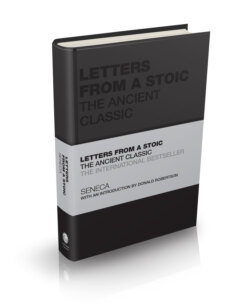Читать книгу Letters from a Stoic - Donald Robertson - Страница 10
SENECA'S FAMILY
ОглавлениеSeneca was born around 4 BCE, in Corduba, in the Roman province of Hispania – modern-day Córdoba in Spain. However, he tells us that we should view the details of his birth as trivial.
As for the fact of my birth: consider what it really is, in itself. Being born is a trivial thing, uncertain, with equal chance of turning into something good or bad. It's certainly the first step to everything else, but it's not better than everything else just because it came first. (On Benefits, 3.30)
Seneca came from a moderately wealthy family of Roman-Spanish knights of the eques, i.e. equestrian class. His writings create the impression of a lifelong desire to rise above, what seemed to him, relatively humble and provincial origins. It was not by accident that Seneca sought to attract the attention of the emperors Caligula and Claudius, and was finally appointed tutor to Nero, ultimately establishing himself at the centre of the imperial court as the emperor's right-hand man. He was a determined social climber who fought hard to be accepted into the highest echelons of Roman society.
Although Corduba had been his family's ancestral home, and his birthplace, Seneca's father brought him to Rome as a small child, where he was raised and educated. His father bore the same name and is therefore known as Seneca the Elder, or sometimes Seneca the Rhetorician. He was a historian who became famous for his work on the art of declamation. Seneca's mother, Helvia, was an educated woman, to whom he addressed an open letter of consolation, which, as we'll see, survives today.
Seneca was the middle of three brothers. His elder brother, Novatus, was adopted by the rhetorician Junius Gallio, from whom he took the name Gallio himself. Gallio was appointed consul and later made governor of the Roman province of Achaea, in modern-day Greece, in 52 CE, under Emperor Claudius. He is mentioned in the New Testament, where the apostle Paul is arraigned before him (Acts 18.12–17). Seneca's younger brother, Mela, was the father of the poet Lucan, who authored the epic Pharsalia, which lauds the great Roman Republican hero of the civil war, Cato of Utica. Lucan was a Stoic, like his uncle Seneca, and they seem to have been quite close.
Seneca had a wife at the time of his death, Pompeia Paulina, but we know very little about her or their marriage. Some historians believe that this was his second marriage and he'd earlier been wedded to a woman whose name is unknown. He mentions having one son who died in infancy, about whom virtually nothing is known. Later in life, Lucan, his highly talented but ill-fated nephew, was perhaps the closest Seneca had to a son.
